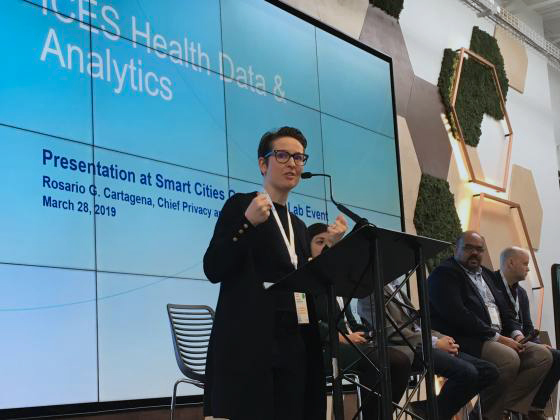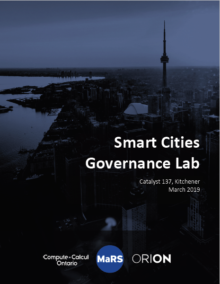As the internet of things grows in the modern world, we find that our lives are more connected than ever and with these growing connections the idea of a smart city is becoming increasingly real. In fact, the Ontario government’s Digital and Data Task Force has just unveiled the second phase of its data strategy consultations. They see the need for governance and are working to protect privacy while still allowing citizens, governments, and the industry to benefit from the data economy.
Smart cities and intelligent communities are important to ORION as we believe in connecting a region’s greatest assets: the diversity of expertise and backgrounds. In this way, citizens, organizations, and sectors can learn from one another and lead development in both the economy and innovation. And when we connect intelligent communities together, they’re enabled to share, collaborate, and reduce duplication, choosing from the best ideas available.
A need for discussion
Many questions about smart cities are emerging from the tech community, researchers, as well as public and private sector. How will they be integrated with public services such as health care, traffic, and housing? What about the ethics and security issues surrounding the collection, storage, and analysis of data gathered through smart city channels? Where can these groups access education and discussion about smart cities?
In March 2019, ORION partnered with Compute Ontario to hold the “Smart Cities Governance Lab”. It addressed some of these concerns and created an opportunity for open discussion about smart cities and intelligent communities. We brought in smart city experts to share excellent insights with the audience.
Engaging sessions and lessons learned
Canadian smart cities: What’s at stake and how to not mess it up – Andy Best from Open Cities Network talked about the state of Canadian smart cities. He offered a broad look at the risks cities face, including managing relationships between industries, cities, and public trusts. Policy, he concluded, needs to influence technology (and not vice-versa) to ensure that smart city systems benefit people, first and foremost.
How Technology Can Inform public policy for smart cities – Dr. Srinivasan Keshav, professor at the Cheriton School of Computer science at the University of Waterloo, discussed how blockchain can be used to inform new public policy. He argues that, as an unchangeable, secure transparent record, it’s an ideal mechanism for making informed policy decisions.
Panel: Different data, different needs – A panel discussion looked at a variety of viewpoints on the use, access, and opportunities created with the data collected from smart cities. Rosario Cartagena from Institute for Clinical & Evaluative Sciences discussed how healthcare data can be used to improve healthcare administration and services. Joe Greenwood from MaRS Discovery District discussed the importance of a citizen-first and transparent approach in sharing public data. Matthew Chandy, from Smart Waterloo Region, discussed his experience in developing an intelligent community and data collaborative for stakeholders. Adam Bilinick from Uber, discussed the Uber Movement website, a public site sharing their anonymous traffic data collected through drivers, offering an example of how industries can share their collected data.
Policy enabling the adoption of technology for the public good – Francis Bilodeau, from the Office of the Chief Information Officer, Digital Policy and Services, presented on the Canadian government’s adoption of new technology, leading to developing new services. He believes that governments should create policies that allow for more technology adoption where possible and that they should learn from practice and doing, rather than theory.
Intro to data trusts – Sean McDonald of Digital Public introduced data trusts and the issues surrounding them. There is still a way to go until data trusts will be ready for smart city development, he says, as we must first answer the legal questions surrounding them.
Digital Leadership – Ryan Androsoff, who leads the Digital Leadership Program at the Institute on Governance, spoke to the issues surrounding digital literacy, specifically within government. Private sector digital companies and citizens want the same of their governments: innovation, efficiency, and transparency. However, even as the speed of change increases, implementing new technologies is difficult and requires organizational change.
A diverse study of data
There is no better way to learn about data governance than to work with it, so the next part of the Smart Cities Governance Lab was interactive. The activities were designed to inform participants about current data governance models used elsewhere and to learn from them. For the first part of the lab, participants examined different data trust models including the Pittsburgh Principles, the Silicon Valley Data Trust, and the DECODE project from Barcelona. In the second lab activity, participants broke into groups and self-identified their own roles and responsibilities in the development of a smart city.
Examining data governance models
So, what did we learn? For every positive attribute of a model, there were concerns.
The Pittsburgh Principle framework was examined for its collection of autonomous vehicle data. It addressed issues important to citizens, like traffic flow. But concerns were raised about the transparency of data collected by these private companies and how limited the public’s access might be.
Those who examined the Silicon Valley Data Trust thought it was a novel idea and that some excellent work was being done towards its social mission of helping at-risk youth by gathering data from public services. However, people thought there could be an issue with its funding and that data trusts need a steady revenue model to keep operating.
Looking at the DECODE project in Barcelona, participants were interested in its direct citizen engagement. The project has worked to give the power to the citizen in directing the smart city efforts being made and, by doing so, it was transparent and communicated regularly with them, allowing them to learn more about smart city data collection. There were still some concerns about how the data could be used even though the it was considered “low risk” data.
Roles and responsibilities in building the perfect smart city
Finally, participants looked at the possible the roles and responsibilities of smart-city project stakeholders.
- Cities and Municipalities – Municipal governments are more directly connected with their citizens than higher forms of governments. Because of this closeness they were well-suited to collaborate and communicate with citizens about their data.
- Government and the Public Sector – Provincial and federal governments should work to ensure that the data being collected is accurate and worth collecting. The data should be used to inform decisions and create useful policies.
- Researchers and Academics – The main role of academics in supporting smart city development is to create and connect emerging technologies and ideas. Researchers need to keep looking for ways to push what a smart city can do and guide innovation for future marketplace adoption.
- Industry – The private sector should take collected data to develop products based on the new needs discovered through data analysis. While doing so, they must make sure the privacy of everyone’s data is upheld.
- Citizens – Citizens’ main role in smart city projects is to ensure that their voice is being heard and that their opinions are being incorporated into new policies. It is up to them to figure out what concerns and issues that must be solved and bring them forward.
Conclusion: Three lessons for smart cities
This event enabled participants to learn what goes into making a smart city and the risks that must be considered when doing so. Many insights were gleaned and those who attended have a better idea of how they can work towards creating smart cities that are secure, collaborative and innovative.
In conclusion, three main lessons we learned from the lab:
- Smart cities start with informed citizens – Education and tools must be given to the citizens
- Smart cities are open cities – Collaboration and transparency are key
- Smart city data needs trusted stewards – The data collected must be in dedicated, secure hands
Read the full report for all the details from the Smart Cities Governance Lab:


